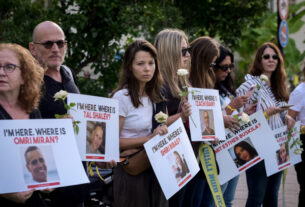As Israel grapples with this especially dark period, bringing to mind the horrors of the Holocaust and numerous Israeli wars, we encounter harrowing tales of violence that leave us sleepless.
For those who’ve lived through these horrors and miraculously escaped, an additional layer of trauma often lingers – “survivor’s guilt.” This guilt is a facet of post-traumatic stress disorder, and intensifies with the gravity of other symptoms.
When subjected to a traumatic event endangering one’s life or bodily integrity, most people develop reactive symptoms. Some recover over time, while others grapple with lingering symptoms that impair daily life. The likelihood of developing prolonged disorders is unpredictable, influenced by factors like preexisting mental health conditions, personal and familial history, past traumas, and personality.
In many cases, survivors who witnessed horrors near them grapple with an overwhelming guilt that persists for years. The initial relief of surviving can transform into profound guilt, stemming from the thought that others weren’t as fortunate. They ask questions like “Why was I saved?” and feel guilty for enjoying life’s pleasures that others may never know.
Those afflicted with this symptom continuously replay the traumatic event, harshly evaluating their actions and blaming themselves for not altering the outcome, though this often lacks any basis in reality. This self-blame offers a false sense of control, somewhat alleviating the helplessness in the face of tragedy.
Understanding this concept and recognizing its signs in loved ones is crucial. Guilt is often accompanied by shame, leading sufferers to suffer in solitude. It’s vital to comprehend that these feelings are common among most survivors of such events.
Several methods can help alleviate the suffering. Providing support during and after the ordeal is vital, emphasizing that the survivor is not alone. Simple statements like “I’m here, and I’m here to stay” hold great significance. All feelings and thoughts must find a non-judgmental outlet for expression.
Return to routine and avoid self-isolation
What may seem rational to an outsider doesn’t always align with the survivor’s perspective. Sharing details of the experience can help regain a sense of control. By reframing the narrative in a positive light, such as telling someone who fled a dangerous place that they were trying to save their life, you provide crucial support.
Returning to a semblance of normalcy, even partially, is essential. Survivors may naturally withdraw and distance themselves, perceiving the world as threatening. This avoidance exacerbates their fears and self-doubt. Addressing basic physical needs like sleep, regular meals, and physical activity is critical for mental well-being. Engaging in creative pursuits, yoga, meditation, mindfulness, or relaxation activities can also be beneficial.
Donating to others in various ways can be a coping mechanism, bolstering a sense of self-worth. Seeking help from mental health professionals, such as therapy, support groups, medication, or psychiatric treatment, is crucial. Early intervention enhances the prospects of long-term coping and recovery.




